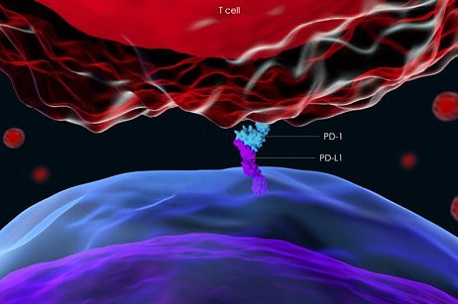Nikhil Prasad Fact checked by:Thailand Medical News Team May 31, 2024 10 months, 3 weeks, 5 days, 6 hours, 39 minutes ago
COVID-19 News: In the wake of the COVID-19 pandemic, the world has been grappling with numerous complications stemming from the virus. Among the most alarming in children is the Paediatric Multisystem Inflammatory Syndrome temporally associated with SARS-CoV-2 (PIMS-TS), a rare but potentially life-threatening condition. This syndrome, also known as Multisystem Inflammatory Syndrome in Children (MIS-C), typically arises two to six weeks post-infection and presents with severe symptoms, including high fever and multi-organ involvement. Recent studies have turned the spotlight on the role of programmed cell death protein-1 (PD-1) in this syndrome, offering new insights into its pathogenesis and potential treatment avenues. This
COVID-19 News report is basedon a study by researchers from Medical University of Lublin-Poland, University Children’s Hospital of Lublin-Poland, Pomeranian Medical University in Szczecin-Poland and University of Szczecin-Poland.
 A New Pediatric Threat - PD-1 in Pediatric Inflammatory
A New Pediatric Threat - PD-1 in Pediatric Inflammatory
Syndrome Post-COVID-19
Understanding PIMS-TS - Clinical Characteristics and Diagnosis
PIMS-TS emerged during the first wave of the COVID-19 pandemic in 2020, characterized by a range of symptoms from persistent fever to severe organ dysfunction, affecting the heart, lungs, and gastrointestinal system. The diagnosis of PIMS-TS is based on specific criteria, and its management often involves immunosuppressive therapies like intravenous immunoglobulins (IVIGs), glucocorticoids, and antiplatelet or anticoagulant drugs. Despite these treatments, the exact pathogenesis and long-term effects of PIMS-TS remain partially understood, necessitating ongoing research.
The Immune System’s Role
The immune system's response to SARS-CoV-2 infection in children with PIMS-TS is complex and involves both humoral and cellular components. Cytokine profiling of these patients indicates a significant release of pro-inflammatory cytokines, such as IL-1, IL-6, IL-18, IL-17A, and TNF-α, which contribute to the hyperinflammatory state observed in PIMS-TS. However, the mechanisms driving this dysregulated immune response are still not fully elucidated.
PD-1: A Key Player in Immune Regulation
Programmed cell death-1 (PD-1), also known as CD279, is a crucial regulatory protein expressed on various immune cells, including CD4+ and CD8+ T cells, B cells, NK cells, and activated monocytes. PD-1 interacts with its ligands, PD-L1 and PD-L2, to modulate immune responses, primarily by inhibiting T cell activation and preventing immune-mediated tissue damage. This pathway plays a significant role in maintaining immune homeostasis and has been implicated in various diseases, including infectious diseases and autoimmune disorders.
PD-1 in COVID-19 and PIMS-TS
In the context of COVID-19, PD-1 expression has been linked to disease severity. Studies suggest that PD-1+ T cells are indicative of immune exhaustion, a state where T cells lose their functional capacity due to chronic antigen exposure. This study aimed to evaluate the expr
ession of PD-1 in children with PIMS-TS and its correlation with clinical outcomes and biochemical markers over time.
The Study: Tracking PD-1 in PIMS-TS
The study involved 33 children diagnosed with PIMS-TS and a control group of 35 healthy children. Blood samples were collected at diagnosis, and follow-up samples were taken at six weeks, three months, six months, and 12 months. The expression of PD-1 on CD4+ and CD8+ T cells was analyzed using flow cytometry, and the results were compared with the control group.
Findings
At the time of diagnosis, children with PIMS-TS showed significantly higher PD-1 expression on both CD4+ and CD8+ T cells compared to the control group. Over the course of treatment, there was a gradual decrease in PD-1 expression, correlating with clinical improvement and reduction in inflammatory markers such as C-reactive protein (CRP) and erythrocyte sedimentation rate (ESR).
PD-1 as a Biomarker and Therapeutic Target
The study's findings suggest that PD-1 expression is a critical factor in the immune dysregulation observed in PIMS-TS. The decrease in PD-1 expression with treatment highlights its potential as a biomarker for disease progression and therapeutic response. Moreover, targeting the PD-1 pathway with inhibitors could offer a novel therapeutic approach to prevent or mitigate the severe immune responses in PIMS-TS. However, such interventions must be approached with caution due to the potential for adverse effects.
Ongoing Research and Challenges
Despite these promising insights, the exact mechanisms by which PD-1 modulates immune responses in PIMS-TS require further investigation. Future studies should focus on elucidating the pathways involved in PD-1 regulation and its interaction with other immune checkpoints. Additionally, long-term follow-up of PIMS-TS patients is essential to understand the full spectrum of immune alterations and their clinical implications.
Conclusion: A Step Forward in Understanding PIMS-TS
This study provides valuable data on the role of PD-1 in PIMS-TS, shedding light on the immune dysregulation underlying this severe pediatric complication of COVID-19. By improving our understanding of PD-1's involvement, we can better predict risks, develop targeted therapies, and ultimately enhance the management and outcomes for affected children. As the fight against COVID-19 continues, such research is crucial in safeguarding the health of our youngest and most vulnerable populations.
The study findings were published in the peer reviewed International Journal of Molecular Sciences.
https://www.mdpi.com/1422-0067/25/11/5968
For the latest
COVID-19 News, keep on logging to Thailand Medical News.
Read Also:
https://www.thailandmedical.news/news/activation-of-type-1-dendritic-cells-cd11c-cd141-clec9a-and-exhausted-natural-killer-cells-are-key-drivers-of-post-covid-multisystem-inflammatory-synd
https://www.thailandmedical.news/news/decoding-long-covid-19-how-interferon-lambda-modulates-t-lymphocyte-pd-1-via-the-akt-gsk3beta-pathway
https://www.thailandmedical.news/news/scientists-from-portugal-find-that-diminished-peripheral-cd8-7-integrin-t-cells-and-anti-sars-cov-2-iga-response-characterizes-long-covid
https://www.thailandmedical.news/news/texas-md-anderson-cancer-center-warns-that-covid-19-mrna-vaccines-elevate-pd-l1-levels-disrupting-lung-cancer-treatments-progressing-other-cancers
